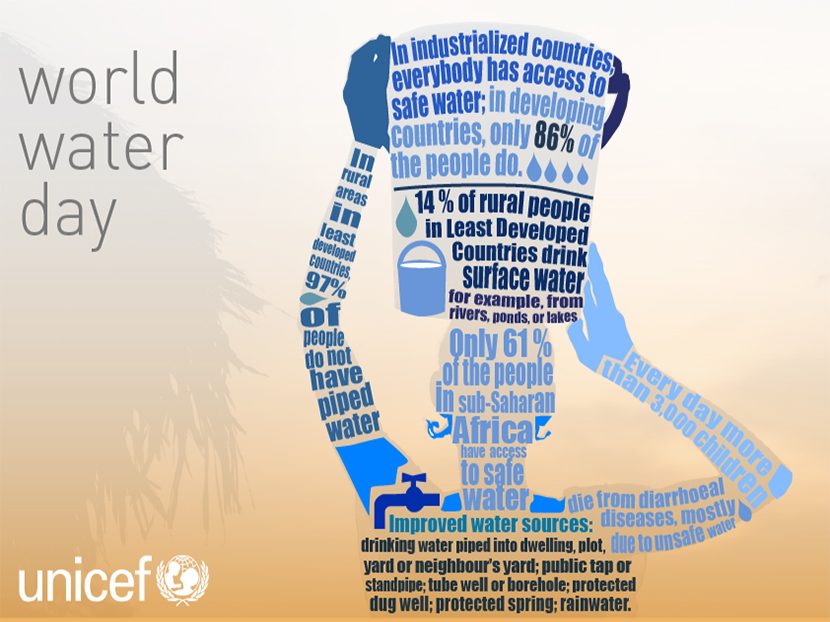Global Initiatives Pour In During March Water Awareness Month

Clean water and adequate sanitation are at the heart of every healthy and successful society. Life without access to H20 jeopardizes the young and old, leaving populations around the world vulnerable to crime, disease, and for many, death.
A number of global water solutions are in progress, and recognized through initiatives celebrated around the world during March, World Plumbing Day and World Water Day, for example, to help drive awareness about sustainable water initiatives.
Water & Sanitation: The Pathway to Better Lives
According to the World Health Organization, 844 million people lack even a basic drinking-water service, including 159 million people who are dependent on surface water. For many, especially in developing nations, daily life can be risky, as 2 billion people worldwide use a drinking water source contaminated with feces.
Lack of clean water can have catastrophic outcomes, as contaminated H20 can lead to fatal diseases. Restricted water access, for example, is linked to approximately 700,000 preventable child fatalities every year, in addition to the millions of cases of diseases related to contaminated water, including diarrhea, cholera, dysentery, typhoid, and polio. Crime also takes a toll on women and children who have no access to sanitation and private toilets in developing nations.
World Plumbing Day Connects Water Infrastructure to Good Health
World Plumbing Day on March 11, established by the World Plumbing Council in 2010, is an initiative to promote the link between good quality plumbing, health, environmental sustainability, and economic prosperity. Hundreds of annual World Plumbing Day events will take place across the globe this year, an effort that brings people from within and outside the plumbing industry together to learn, share knowledge, build connections and find opportunities to collaborate to improve the quality of, and access to, fresh water and safe sanitation.
As part of its ongoing mission, the WPC works in partnership with several organizations, including IAPMO, a member and audited designator of the American National Standards Institute; the World Skills Foundation; Health Habitat; and RMIT University, on a new initiative called the Community Plumbing Challenge, which aims to involve plumbing practitioners from several countries for provision and upkeep of sanitation facilities in deprived sections of societies.
World Water Day 2018 Recognizes Nature for Water
This year's theme for World Water Day, March 22, is "Nature for Water," and explores how we can use nature to overcome the water challenges of the 21st century. According to the initiative, "environmental damage, together with climate change, is driving the water-related crises we see around the world. Floods, drought and water pollution are all made worse by degraded vegetation, soil, rivers, and lakes." Recommended by the United Nations Conference on Environment and Development 25 years ago, the United Nations General Assembly officially launched World Water Day in 1993.
This year, the initiative comes at a time when new reports shed light on the water shortage crisis in South Africa, indicating that water supply in Cape Town is expected to run out by April 21, a day referenced as 'Day Zero.'
Collaborative Efforts for Non-Sewered Sanitation through ISO Project Committee 305
Another ongoing effort is the International Organization for Standardization’s Project Committee 305, sustainable non-sewered sanitation systems, which works toward standardizing innovative technologies to improve the world’s water crisis. The group, along with expert stakeholders, is currently at work developing an international standard for non-sewered sanitation systems.
The committee is devoted to reinvented toilets, or non-sewered sanitation systems, which are sustainable and can help prevent disease and death. The devices help remove pathogens and unlike traditional toilets, do not require traditional sewage infrastructure. They operate off the grid in terms of water supply, and electricity, and cost less than US $.05 cents per user per day--providing an opportunity for developing countries to utilize safer, cleaner, cost-efficient toilet alternatives.
“Reinvented toilet technology” can ultimately help reverse the global sanitation crisis by removing pathogens without requiring traditional infrastructure, providing for cleaner and safer toilets on a global level.
The Draft International Standard for ISO 30500 was circulated in January of 2018. Members of ISO PC 305 will be working to address any comments that come in during this stage in an attempt to finalize the international standard. The standard will be applicable to individual and small scale sanitation systems that are self-contained, meet defined discharge requirements, and aim for sustainability. The goal of this effort is to provide an efficient starting point for international standardization on a system to safely process human waste and recover valuable resources such as water, energy, and/or nutrients in an off-grid and non-sewered environment.
The U.S. holds leadership of PC 305, with Doulaye Kone of the Bill & Melinda Gates Foundation serving as chairman, and ANSI serving as twinned secretariat alongside ASN, Senegal’s member body of ISO.
American National Standards for Water Treatment, Management, and More
ANSI has accredited a number of standards developing organizations that work in the area of water treatment and management. These organizations include:
American Water Works Association
American Society of Plumbing Engineers




